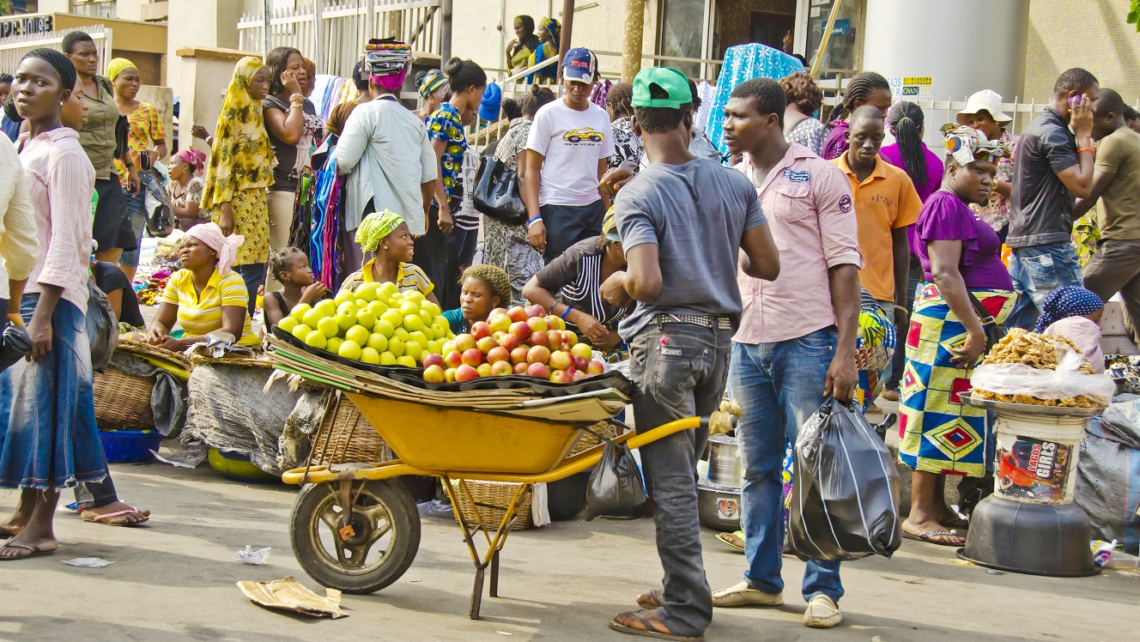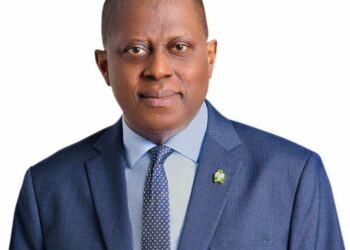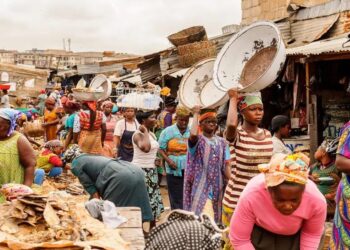There are palpable signs that the Nigerian economy is at the edge of a fiscal cliff, and could soon be wallowing in an economic crisis if there is no urgent reversal of poor economic policies.
To bolster the assertion, the acting accountant-general of the federation (AGF), Mr. Anamekwe Nwabuoku, recently acknowledged Nigeria’s inability to pay salaries, which, according to him, is absurd. He identified dwindling revenues as a dominant factor that compelled the federal government “to resort to other sources to augment for the payment of salaries of federal public servants.”
Prior to that, the minister of labour and employment, Chris Ngige stated that Nigeria is broke and thus incapable of financing capital projects in 2023. According to the minister, this situation seriously incapacitates the government in meeting the demands for pay rise of the various trade unions.
That fiscal cliff means a situation in which a particular set of financial factors cause or threaten sudden and severe economic decline, clearly means Nigeria is at the edge, given the circumstances.
The ‘back to square one’ debt malaise has been rearing its head in the past few years, especially under the watch of President Muhammadu Buhari. Nigeria currently is finding it difficult to pay its debt and thus virtually in a serious debt trap. Currently, the percentage of total government revenue that goes into debt service payment is virtually 100.19 per cent.
Another telltale sign of a looming fiscal crisis is the fact that some of Nigeria’s strategic development partners, including China, are displaying caution by declining to extend more development credit.
Antecedents show that the federal government should not embrace borrowing to meet its recurrent obligations at a time of the historic rise in crude oil prices worldwide. But this has been the grim reality of Nigeria’s fiscal environment under President Muhummadu Buhari, about two decades after former President Olusegun Obasanjo negotiated debt relief for Nigeria.
As revealed in the debt records obtained from the Debt Management (DMO), this crisis did not start under Buhari’s administration. In 2007, for instance, the relief crashed external debt to $3.65 billion, from $31 billion it owed Paris Club, and $5 billion it owed London Club. Its domestic debt then stood at about $18.57 billion for the entire federation.
But the debt trajectories portrayed Nigeria’s relapse to borrowing just after the end of Obasanjo’s administration. Under the administration of President Umaru Yar’Adua, for instance, Nigeria’s total public debt rose from $22.23 billion in 2007 to $35.09 billion in 2010, indicating an increase of 57.84 per cent.
This trend continued into the era of President Goodluck Jonathan. From $35.09 billion in 2010, the country’s debt escalated to $65.43 billion in 2015. This represented an increase of 86.46 per cent. Under the Buhari administration, according to the debt records, public debt steadily increased by 52.97 per cent to $100.09 billion in March 2022.
When the AGF recently said this at an Abuja retreat, the trend again elicited protracted debate among analysts nationwide. Some argued that the rising debt profile had put Nigeria in an extremely weak fiscal position. The ugly trend, as others believed, could push the federation into the abyss of bankruptcy if not well managed.
But the DMO shared an entirely different view for two reasons. First, the debt stock only represents 23.27 per cent of the GDP, which the debt office said, is still below a 40 per cent national threshold. Second, diverse policy initiatives aimed at growing and diversifying revenues are yielding results. By implication, according to the debt office, the debt stock is not beyond what Nigeria can sustain.
On different fronts, fiscal experts have explained reasons that justify the resolve of the federal government to borrow to offset wage bills, even when it violated section 41 of the Fiscal Responsibility Act, 2007. The AGF, for instance, attributed it to two major triggers. He, first, ascribed it to rising insecurity, which analysts agreed, had been at the core of Nigeria’s heinous socio-economic challenges.
Also, the AGF explained it in the burning social needs of the people, who were either casualties of armed violence in the north or victims of economic distress in the major cities. The latter became compounded after the economy slid into recession first in 2016 and also in 2020. With humanitarian crises, poverty indices and unemployment rates escalating by the day, analysts argued, the federal government embraced the option of investing more in social support programmes to prevent outright descent into criminality.
According to the chief executive officer of Economic Associates, Dr. Ayo Teriba, in the last seven years, far-reaching reasons accounted for the failure of the federal government to fulfil its basic recurrent obligations. In 2016 when the economy slumped into distress, specifically, Buhari himself blamed it on an extremely low crude oil price, which then dropped to about $29 per barrel.
In 2020, the outbreak of COVID-19 triggered another economic downturn, which the chief executive officer of the Centre for the Promotion of Private Enterprises (CPPE), Dr. Muda Yusuf claimed, was the fallout of the country’s previous fiscal indiscipline and the failure to create an enabling regulatory environment that could attract massive investments and spur economic activities nationwide.
But the problem is not as simple as how some analysts put it, especially with the historic rise in the crude oil prices. From $29 in 2016, Bonny Light is currently about $100 per barrel. Ordinarily, this should be an advantage for the federation but the increase has not translated to fortune due to what Teriba ascribed to as unprecedented cases of oil theft that are affecting oil production and the vicious regime of fuel subsidy that escalated the cost of under-recovery.
In particular, the incidence of oil theft has sparked national outrage among key actors in the petroleum industry. This concern arose from the volume of crude oil being lost to oil thieves daily. The chairman of Heirs Oil and Gas, Mr. Tony Elumelu put it at about 95 per cent of the country’s production capacity. For chief executive officer, Seplat Energy Plc, Mr. Austin Avuru, it is as high as 80 per cent.
Also, the Nigerian Upstream Petroleum Regulatory Commission (NUPRC) admitted the trend of oil theft. But its chief executive, Mr. Gbenga Komolafe, conservatively put the loss at 7.6 per cent. Even though the exact volume of stolen oil cannot be ascertained, the trend has been grave for governments at all levels.
The gravity of its consequences is evident in the failure of the Nigerian National Petroleum Company (NNPC) to remit its projected revenue into the Federation Accounts.
In 2021, for instance, the then corporation was projected to remit N2.5 trillion into the Federation Accounts. But at the end of the fiscal year, the corporation could only remit N542 billion, accounting for about 21.58 per cent of its projected revenue.
By 2022, the shortfall grew worse than it was in the previous fiscal year. Of its N1.47 trillion projected as remittance, the then corporation has not been able to remit a dime due to what its group managing director, Mallam Abba Kyari attributed to the increasing cost of under-recovery, which weakened the capacity of the federal government to pay wage bills without borrowing.
With these grim fiscal realities, economists observed, Nigeria can slide into insolvency amid rising public debt stock and dwindling revenues. But most of them are divergent on how this challenge can be handled in the interest of the citizenry.
The chief executive of Anthill Concepts Limited, and member of the Board of Economists, Dr. Emeka Okengwu, said he believes Nigeria is not on a fiscal cliff yet, but cautioned that there is the need for fiscal and monetary authorities to be circumspect in managing the economy. He said it is important to rearrange its priorities as a nation when borrowing.
Speaking about revenue generation, Okengwu said Nigeria has the potential to generate income in cash crops, citing that till date the country is still importing maize to meet its local needs.
He stressed that Nigeria needs to fix her critical infrastructure to ensure optimal production. He also stated that Nigeria needs to tap into the mining sector and deepen agriculture activities to tackle the pinching issues of insecurity and job creation.
To some degree, Yusuf, former Director-General of Lagos Chambers of Commerce and Industry, subscribed to the options before the federal government. In specific terms, however, Yusuf canvassed a radically-restructured economy, which could enable the real sectors to catalyse massive investment inflow, cut the cost of governance significantly and boost fiscal accountability.
Teriba proposed a more pragmatic option that could ease the country’s burden of public debt. He believes more in securitising the country’s idle assets than the increasing tax burden on corporate citizens and individuals. Securitisation of idle assets, he argued, provides access to much-needed liquidity and relieves the federal government of the burden of debt repayment and servicing.
He further explained how Saudi Arabia embraced this option by selling about two per cent of its stakes in Aramco at over $29 billion. With what it realised from the sale of two per cent stakes in its oil conglomerate, he observed, the country was able to inject life into its crawling economy without the burden of debt repayment and servicing. With this approach, Nigeria can register all its idle assets, list them in the stock market to know their values and determine the percentage of its interests to be listed for investments.
Professor of management, Dangote Business School, Bayero University, Kano, Prof Murtala Sabo Sagagi, said with debt servicing exceeding revenue, Nigeria is heading not only towards debt crisis but complete economic collapse by 2023.
“Over the last 7 years, the government recklessly resorted to debt financing and overlooked all viable growth opportunities, leaving little room for revenue generation.
“The high appetite of the government to borrow without commensurate effort to cut costs of running government, curb corruption, develop infrastructure and energy sector and stimulate inclusive growth is the painful legacy of this administration Which only a visionary and well-intentioned successor can overcome,” he stated.





